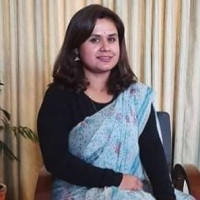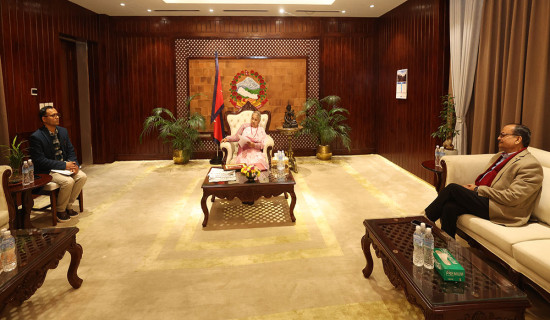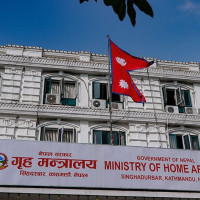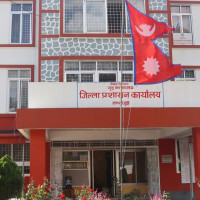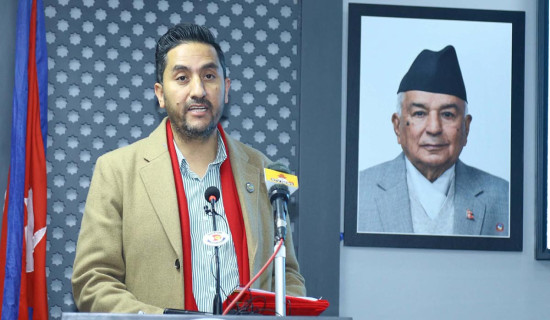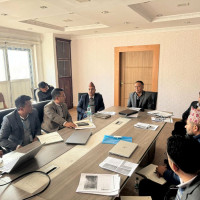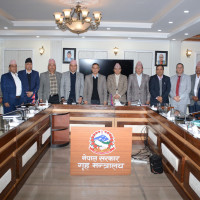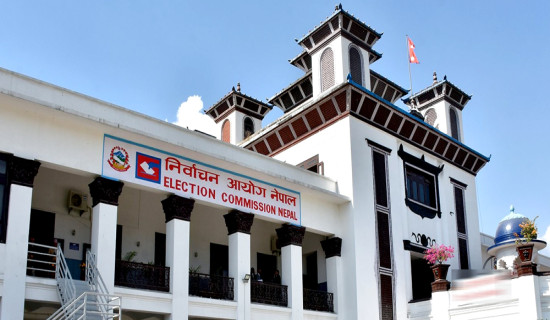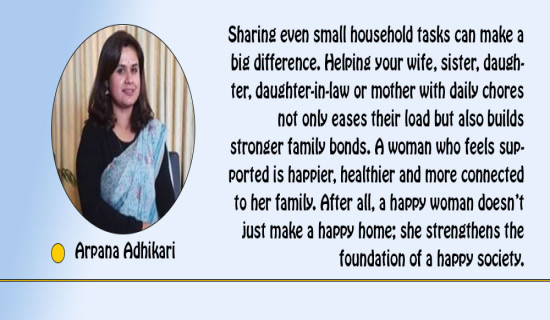- Wednesday, 7 January 2026
Election Commission to allot only 15 days for poll canvassing
Lalitpur, Aug. 15: The Election Commission (EC) has decided to print the election symbols of only those political parties and independent candidates who have filed their candidacies in the concerned constituency under first-past-the-post (FPTP) election to the House of Representatives and the Provincial Assemblies.
Speaking at an interaction the Commission held with editors of mainstream media here on Sunday, Chief Election Commissioner Dinesh Kumar Thapaliya said the election symbols of only those political parties and independent candidates who filed their nomination under FPTP category would be printed on the ballot paper.
If any party doesn’t have a candidate under FPTP category, the ballot paper will not have that party’s election symbol, he added.
“There will be separate ballot papers for the FPTP and Proportional Representation (PR) system of election to both the House of Representatives and Provincial Assemblies,” said Thapaliya. According to him, the EC is planning to print 80 million ballot papers for November 20 polls.
Earlier, in the May 13 local polls, the EC had printed election symbols of all the parties registered with EC, though there was an electoral alliance among various political parties. As a result, the ballot turned out too big in size and many voters were confused. This was blamed for the high rate of invalid votes.
13 million voters likely to cast votes
The EC has estimated that around 13 million voters will cast votes in the November 20 elections.
Around 18.2 million voters are estimated to have been registered for the upcoming election. The final voter list has not been published yet.
Thapaliya said, "It is estimated that around 4 million voters out of 18.2 million are abroad. Considering this fact, we estimate that around 13 million voters will exercise their franchise this time.”
The voter turnout may increase further, as the EC has kept the employees deployed for elections, security personnel, inmates, and voters sheltered in old age homes operating with approval have been included in the temporary voters’ list. They will be allowed to exercise their voting rights under the PR category, he added.
“The EC has estimated that about Rs. 10 billion rupees will be spent for the elections of federal and provincial assemblies. Similarly, there will be approximately 10,825 polling stations and 22,500 polling centres,” Thapaliya said.
The EC has been preparing to reduce the electioneering period for the upcoming elections from 39 to 15 days.
The arrangement is being sought to prevent candidates from overspending because of long electioneering period, said Thapaliya.
In the 2017 general elections, the EC had provided 39 days for electoral campaigning. He informed that discussion was underway to provide only 15 days for electoral campaigning, said Thapaliya.
As per the proposed House of Representative and Provincial Assembly Election Guideline which is under consideration in the commission, candidates and political parties won’t be allowed to conduct electioneering more than 15 days.
The EC has scheduled the nomination for the election under the FPTP system only in the second week of October. Property details mandatory to file candidacy The EC is going to make it mandatory for the candidates to submit their property details before filing their nomination for the upcoming elections.
According to Thapaliya, those willing to file their candidacy for the upcoming polls will first have to submit their property details. “The property details will be released once the candidate is elected.”
Answering the queries of the editors over the use of Electronic Voting Machine (EVM), Chief Commissioner Thapaliya said the EC was ready to conduct the election using EVM from this election. However, the political parties have not reached an agreement over its use.
He highlighted that an obligatory provision is needed to conduct the election by using EVM. He also informed that the EC could use the EVM in the presidential and vice-presidential election.
Thapaliya also said the EC might introduce an e-voting system from the next election to ensure the voting rights to about 4 million Nepalis living abroad.
In 2018, the Supreme Court had issued a directive order in the name of government for ensuring voting rights of Nepalis living abroad but it had not been implemented yet.
Talking about the tenure of the members of HoR and provincial assemblies, he said the tenure of incumbent members of the House of Representatives and Provincial Assemblies would expire automatically after filing the nominations.
The EC also said it had learned lessons from some mistakes made in the recent local polls and it would correct them in the upcoming elections.


